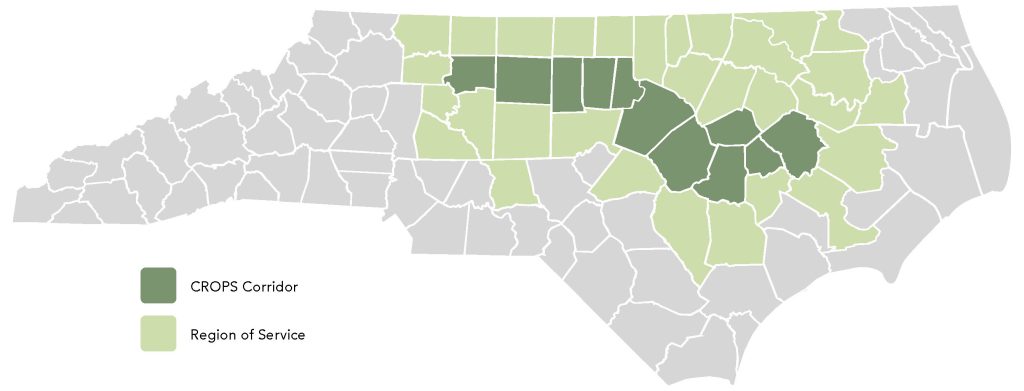Through a new NSF Engines award, Carolina and nine partners will develop a plan for a 42-county Agricultural Tech Innovation Corridor, boosting innovation and access for underserved agricultural communities across North Carolina.
Agriculture is a cornerstone of North Carolina’s economy and provides a livelihood for a significant portion of its population. But most of the research and technological innovations that could benefit and grow the $103 billion industry are housed within companies and universities in more urban areas of the state.
To address this gap in access, researchers at the University of North Carolina at Chapel Hill, along with other nine other university, business, state agency, and research partners, has received a prestigious National Science Foundation (NSF) Regional Innovation Engines award to develop a 42-county Agricultural Tech Innovation Corridor that will enable advancements in agriculture to reach underserved areas of the state faster.

The project, called the Climate-Responsive Opportunities in Plant Science (CROPS) initiative, includes researchers from Carolina, North Carolina Agricultural and Technical State University, Duke University, East Carolina University, North Carolina State University, and Wake Forest University. It also incorporates specialists and county agents from the N.C. Cooperative Extension Service, industry leader N.C. Biotechnology Center, the non-profit research institute RTI International, and the North Carolina Community College System.
“Through this broad collaboration, we will supercharge our agriculture sector by leveraging the unique strengths of our partners and sparking innovation that benefits the entire state,” said Carolina Eminent Professor of Convergent Science Gregory Copenhaver who serves as the University’s lead on the project. “CROPS envisions a future of climate-resilient agriculture in rural North Carolina, leading to a new generation of empowered and prosperous small- and midsized farms that contribute to thriving rural communities.”
Free educational programs delivered through the 10 institutions will cover farming technologies, agricultural business management, and natural resource conservation. The project will also help small producers identify profitable new crops and livestock ventures and assist in developing community-based local food systems.
“New farmers, underserved farmers and those with small-scale acreage need information to develop practices that protect the environment, produce the highest quality food, and provide reliable family income,” said Gregory Goins, CROPS project lead and associate dean for research at NC A&T’s College of Agriculture and Environmental Sciences. “Our team seeks to develop a plan to bring information from industry to farmers, particularly in underserved areas, that helps them mitigate climate impacts, lowers the barriers to market entry that they face, and boosts economic output.
A strong workforce development component will foster economic performance for small-scale farms, increase diversity in agriculture, and emphasize climate-smart techniques for resilience. This initiative is modeled on the success of North Carolina’s investments in the Research Triangle Park and the N.C. Biotechnology Center, aiming to achieve similar economic development across the Ag Tech Corridor. It also builds upon the successful Carolina-NC A&T Looking Forward seed-funding program, demonstrating the power of collaboration to address statewide concerns.
